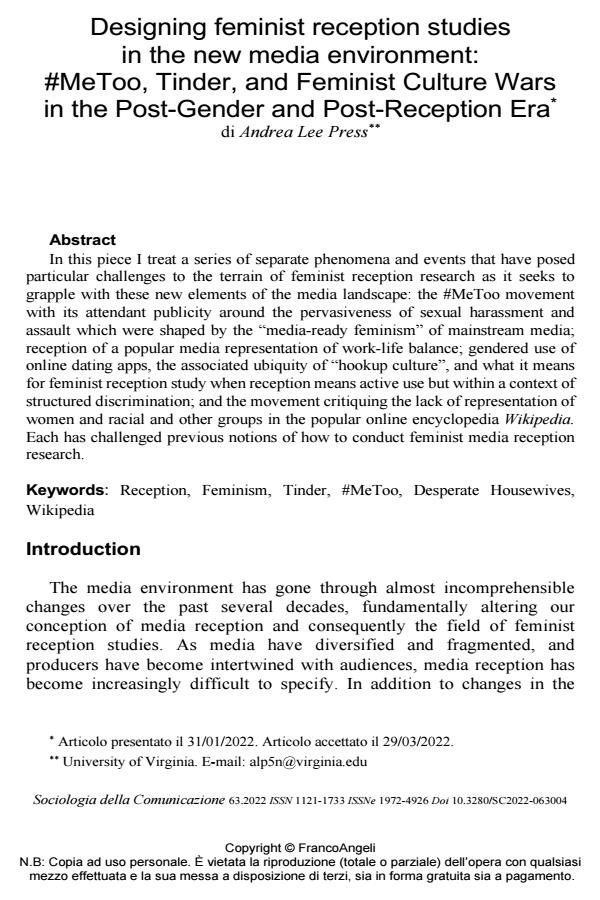Designing feminist reception studies in the new media environment: #MeToo, Tinder, and Feminist Culture Wars in the Post-Gender and Post-Reception Era
Titolo Rivista SOCIOLOGIA DELLA COMUNICAZIONE
Autori/Curatori Andrea Lee Press
Anno di pubblicazione 2022 Fascicolo 2022/63
Lingua Inglese Numero pagine 18 P. 58-75 Dimensione file 345 KB
DOI 10.3280/SC2022-063004
Il DOI è il codice a barre della proprietà intellettuale: per saperne di più
clicca qui
Qui sotto puoi vedere in anteprima la prima pagina di questo articolo.
Se questo articolo ti interessa, lo puoi acquistare (e scaricare in formato pdf) seguendo le facili indicazioni per acquistare il download credit. Acquista Download Credits per scaricare questo Articolo in formato PDF

FrancoAngeli è membro della Publishers International Linking Association, Inc (PILA), associazione indipendente e non profit per facilitare (attraverso i servizi tecnologici implementati da CrossRef.org) l’accesso degli studiosi ai contenuti digitali nelle pubblicazioni professionali e scientifiche.
In this piece I treat a series of separate phenomena and events that have posed particular challenges to the terrain of feminist reception research as it seeks to grapple with these new elements of the media landscape: the #MeToo movement with its attendant publicity around the pervasiveness of sexual harassment and assault which were shaped by the "media-ready feminism" of mainstream media; reception of a popular media representation of work-life balance; gendered use of online dating apps, the associated ubiquity of "hookup culture", and what it means for feminist reception study when reception means active use but within a context of structured discrimination; and the movement critiquing the lack of representation of women and racial and other groups in the popular online encyclopedia Wikipedia. Each has challenged previous notions of how to conduct feminist media reception research.
Parole chiave:Reception, Feminism, Tinder, #MeToo, Desperate Housewives, Wikipedia
Andrea Lee Press, Designing feminist reception studies in the new media environment: #MeToo, Tinder, and Feminist Culture Wars in the Post-Gender and Post-Reception Era in "SOCIOLOGIA DELLA COMUNICAZIONE " 63/2022, pp 58-75, DOI: 10.3280/SC2022-063004